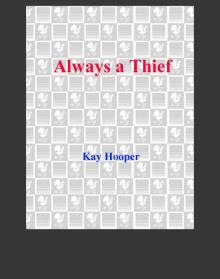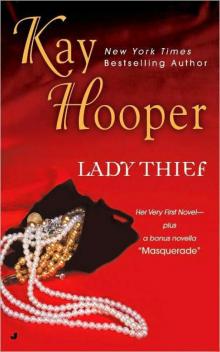- Home
- Kay Hooper
Shades of Gray Page 3
Shades of Gray Read online
Page 3
“You never asked him why, did you, Sara? You just ran in the night, tearing the heart out of him—”
“And I’ve been running ever since!” she said, interrupting fiercely. “Hunted like an animal until he finally caught me. So don’t expect any sympathy, Colonel Durant!”
There was a moment of silence, and then Durant said wearily, “He should have told you. Perhaps he would have, but you looked at him as though he were a monster, didn’t you, Sara? Your mind was made up, and he was found guilty and convicted by you without even the opportunity to defend himself. You wouldn’t have heard him, wouldn’t have believed him.”
“What are you talking about?”
Durant hesitated, glancing toward the house. Then he sighed. Looking back at her, he said evenly, “Andres has enemies, you know that. The rebel leader, for one.”
Impatiently she said, “I know. Lucio.”
“Andres and Lucio were once friends. In fact, Lucio was Andres’s second in command in the revolution that deposed the former regime. Once Andres was in power, Lucio became … dissatisfied, bitter, resentful. Andres was forced to proceed with caution in his efforts to improve the country; perhaps Lucio felt he wasn’t moving fast enough. I don’t know the full story. I only know that there was a final, bitter confrontation, and Lucio fled to the hills and gathered an army. For several years now he has attempted to destroy Andres.”
“I don’t see what that has to do with me,” she said.
Durant smiled bleakly. “Everything. The international press enjoyed their stories of a ruthless dictator falling in love with a young woman he had met in Trinidad. Within a matter of days everyone who could read knew the stories. You became a possible tool, Sara, for Andres’s enemies to use.”
After a moment she said slowly, “I don’t understand.”
“I think you do. One of the reasons Andres brought you here so soon after you met was to protect you. Once Lucio learned of Andres’s feelings for you, he learned also of the first chink in Andres’s armor. He could have captured you, used you to bend Andres to his will. When you ran away, Andres was half mad with fear for you.”
“I was safe in the States,” she objected.
“No. You were never running from Andres’s detectives, Sara; we were never able to get that close. It was Lucio’s confederates who hounded you all this time. It was they who gave you no peace. If Andres had not called in a favor from an American agent with far greater resources than our own, Lucio may well have captured you. Andres had you kidnapped and brought back here so that he could keep you safe.”
Sara couldn’t believe it, refused to believe it. “I’m only staying a month. Then I have Andres’s word that I can go home for good.”
Durant nodded. “Yes. It gives us only a few weeks to accomplish what we have been unable to accomplish in years: to defeat the rebels. You will never be safe until Lucio is dead. He knows Andres too well.”
Holding on to her precarious disbelief, she said. “It doesn’t make sense! It’s been two years. Lucio can’t possibly think I can be used against Andres now—”
“He’s hounded you for two years.”
“I only have your word for that!” she snapped.
“You still don’t understand, do you?” Durant said harshly. “With you in his hands, Lucio would have anything and everything Andres could give him. You are Andres’s one vulnerability. Two years or twenty, it makes no difference. He would sell his very soul to spare you pain! And you looked at him as though he were a monster. Think about that.”
TWO
LONG AFTER DURANT had stalked back toward the house, Sara stared at the spot where he had stood. “There are still the terrorists,” she murmured to herself, but the words were hollow.
The thought was hollow. If it had indeed been Lucio, rather than Andres, who had hounded her for two years … if Andres had brought her back here now only to keep her safe until he could deal with Lucio …
It wasn’t Sara’s intention to wait in the garden for Andres to come to her. If she had ever considered that he would come to her, she would have believed it unlikely after the things she had said to him. She meant to go to him, to ask him for the truth. But as she sat there in the peaceful gazebo trying to get up her courage, Andres did come.
He came with a guarded face and shuttered eyes, and his voice was calm and formal. “Vincente shouldn’t have told you,” he said, sitting down in the other chair. “There was no reason to disturb you with Lucio’s mad schemes.”
“I had a right to know the truth.” Her voice was strained. “You should have told me. Would you prefer that I hate you for something you didn’t do?”
“Does the reason for the hate matter?” he asked bleakly.
“I don’t hate you.” She heard the words emerge from her mouth and rose jerkily to go and stand at the railing, staring blindly toward the mountains. What had she said? Her control was slipping, and she grasped at it desperately. She knew Andres had gotten to his feet, because he wouldn’t sit while a woman stood. She knew he was behind her. “I just can’t understand …”
“Sara.”
She didn’t move, didn’t turn. No wonder his voice had moved a country already long sick of revolution and suspicious of promises to take up arms and fight yet another war. How easily it moved her, even now. And she was suspicious of promises too. She didn’t want to fight. “Do you know how my parents died?” she asked abruptly, her voice uneven.
“No. You never told me.”
Sara turned stiffly and faced him, her arms folded protectively, warning him off. “Terrorists.”
Andres closed his eyes briefly, and his face tightened. “I’m sorry, Sara.”
“They were in Europe. Just … coming out of a restaurant. It was their anniversary, you see, and they’d been celebrating. When the bomb went off, it shattered windows for a block. And there wasn’t much left of the restaurant. Fifty people died, including my parents. Including a young mother and her baby who were strolling along the sidewalk. All dead. And do you know who claimed responsibility for the explosion?”
He knew. And he now knew why she had run away from him in such anguish. “The Final Legion?”
Sara nodded. “The Final Legion. Such a grand-sounding name, isn’t it? Such a grand name for a pack of soulless murderers. They claimed responsibility, grabbing every headline they could, railing against a corrupt society. And they congratulated themselves on their strike for freedom. Then they just melted away … laughing.” She caught her breath raggedly and lifted her chin, staring at him from hot, hurting eyes. “Six months later I came to Kadeira with a charming man and found out that he allowed them to live here. Knowing—knowing—what they were, he gave them a home.”
“Dios, Sara, I’m so sorry.” He stepped toward her, his hands lifting to hold her shoulders gently. “I never wanted to hurt you that way—”
“Is there another way?” she asked fiercely, jerking back from him and moving to put a safe distance between them. She didn’t want him to touch her, because when he did, she thought she could mindlessly forgive him worse than terrorists, and that realization terrified her.
Andres slid his hands into his pockets and met her gaze steadily. “What would you have me say? I can’t turn back the clock, Sara. I can’t tell you they were never here. They were here, and I did allow them to stay.”
“Why? Why?” Baffled, she shook her head helplessly. “Because they paid you money? What kind of man does that make you, Andres?”
He stood looking at her for a long moment with something almost hesitant in his eyes. And then, in a change that was as visible to her as a curtain dropping, he was shut inside himself. And she was implacably shut out.
“If you don’t know what kind of man I am, Sara,” he said remotely, “then nothing I could say would give you that knowledge. But I will tell you this: If I could turn back the clock, I would change only one thing. I would make very certain that you learned of the Final Legion’s presence in Kadeira from me, and not from so
meone else.”
“Only that?” she whispered.
“Only that. I would change nothing else. And I will not apologize for my actions, Sara, because I do not regret them. Do you understand? Given the identical situation, I would act now as I acted then.”
The unequivocal statement should have made Sara at least more certain of her feelings. His own words, after all, were clear proof that she had been right to escape a man who could welcome terrorists and give them sanctuary in his country, accept payment for his hospitality from them, and then feel no compunction about what he had done two years later. But, oddly, his words only caused her to become even more confused.
It just wasn’t right that Andres could do such a thing. And yet he had. He didn’t deny it. He made no excuses, offered no defense. In fact, his own words were a self-indictment. Yet Sara felt as if he were showing her an image that was somehow distorted, blurred; there was something wrong with the image, and she didn’t know what it was. Despite everything, she couldn’t quite believe he was as villainous as he seemed. But she didn’t trust even that mental wavering. There was still, in Sara, that young woman who had fallen in love with a complex, charismatic man—and had learned, at a high cost to herself, that her own judgment was tragically faulty.
What was he? What was he?
“I don’t understand,” she said finally, hurting too much not to try to make sense of it all.
“No, you don’t.” Andres’s almost gentle voice was in stark contrast to the stonelike expression on his face. “Because I am not playing the game according to the rules, am I? I should apologize, tell you it was all a mistake. That I was wrong to do what I did. You could forgive me for a mistake. Those are the rules. But this isn’t a game.
“You want things simple, Sara. Either I am as black as I am painted—or I am not. But the truth is never simple. You could forgive me were I to convince you that I feel regret or remorse for what I did. You could forgive me, and perhaps we could build on that, you and I. But we would build on a lie, and I’ll have no lies between us.”
Unsteadily she said, “What are you asking of me? That I trust you blindly, accept on faith that you had a good reason to allow them here? To receive money from them? What reason could there possibly be, Andres?”
“I did what I had to do,” he answered flatly. “The reasons aren’t important now. I gave them sanctuary. I won’t apologize for that, Sara. Not even to you.”
After a moment she turned and walked away from him.
“Well?” Lucio snapped out the question, frowning in annoyance at the sputtering lamp that barely illuminated the dank, dark cave.
His lieutenant, a burly, bearded man named Sabin, sketched a brief, somewhat haphazard salute and reported stolidly, “She’s here. A small boat delivered her just a few hours ago. Impossible to get near her; Sereno had a cordon thrown up around the town, and snipers on the rooftops. He was taking no chances.”
Lucio leaned back in his chair, his frown deepening. But there was neither surprise nor displeasure in his voice. “I always suspected Andres knew well how to guard a treasure,” he remarked. “Particularly if that treasure was coveted by another.”
Sabin waited in silence, having learned, like all Lucio’s men, that their leader strongly disliked having his thoughts interrupted. In the flickering lamplight Lucio appeared both cruel and intelligent; in his case, appearances were not deceptive. His black eyes, unusually—and perhaps unnaturally—large and brilliant, were filled with cunning. His mouth, wide and mobile, was both sensual and cruel.
He was shrewd in military matters, and commanded loyalty from his men by the sheer strength of his personality—and by fear. They were all afraid of him, Sabin included. But Sabin, like the other lieutenants who formed a barrier between Lucio and his army, was a man who knew nothing but war. When Sereno and Lucio had ended the last revolution and thus brought peace, men like Sabin had been left rudderless.
Eventually, of course, most of those soldiers would have fit themselves into a peacetime military. But in the interim they had been vulnerable, and Lucio’s swift defection from Serene’s regime had given Sabin and those like him a new war. Politics mattered not at all to them, only fighting. Lucio had offered a fight, and they had joined him.
And now, waiting patiently, Sabin felt little curiosity about his leader’s reasons for wanting the woman. It would be, no doubt, because she could be used as a weapon in some way.
“Andres will see to it that she keeps to the grounds, where he can protect her,” Lucio said, musing. “It would be foolish to storm his little fortress, of course. So we shall have to draw the woman out.” He glanced up, saw Sabin waiting patiently, and gestured. “We will discuss it later. Dismissed.”
Sabin saluted again and left the cave.
Alone, Lucio absently watched the lamplight throw weird shadows on the rough walls. He could hear, out in the cloying heat and damp of their jungle camp, the voices of his men; he didn’t think about them. He thought about the woman—and about Andres.
The one could be used to break the other. Once in his possession, the woman would be the most powerful weapon he could hope to use against his bitter enemy. He hadn’t decided how best to use that weapon, but he would. Like all his weapons, she would be used to maximum effect.
He meant to destroy Andres Sereno.
“What kind of man does that make you?”
The question echoed in his mind long after Sara had disappeared back toward the house. He stood gazing at the beautiful mountains that not even half a century of revolution had been able to destroy, and he couldn’t find an answer to her question.
Did the end justify the means? Did it matter at all that he had allowed them here so they could have been closely observed by the people who intended to bring them to justice? Would Sara understand if he explained that he had been asked by the head of a secret American agency to provide a base for the terrorists just so that they could be observed and studied, their weaknesses pinpointed—their next target identified?
Perhaps she would understand. Certainly she would forgive him, he thought. And yet he had been unable to offer that simple explanation. It was simple and factual, but it was not the entire truth. It was, as he had told her, far more complex than that. It was a matter of favors asked and owed, a matter of desperate need for his country, a matter of a delicate and dangerous chess game where people named as friends were in fact enemies, where people named as enemies were often friends.
In the end it had been a matter of his own conscience.
He had not sold them arms or offered aid, merely a base where they could live unmolested. He had helped make their continued existence possible, when he just as easily could have ordered his army to capture them. He could have had them executed or had them thrown into his prison for the duration of their natural lives, actions that most of the world no doubt would have applauded privately, if not publicly.
Instead he had offered them sanctuary here on Kadeira—in the eyes of the world. In Sara’s eyes. And there had been no connection made by the world or by her when the Final Legion had been quietly and effeciently captured one week after leaving Kadeira, and before they could kill again.
Only Adrian, the leader of that group, had managed to escape, and he hadn’t been heard of since. The Final Legion had been more or less forgotten in the year since their capture, replaced in the news by other groups. Forgotten by all except those like Sara, who had lost loved ones.
And by Andres Sereno. He would go to his grave with the blood of their crimes on his soul. But Andres could bear that. He didn’t know if Sara could.
He left the gazebo, walking slowly back through the garden, his hands in his pockets. He wondered grimly if he would be able to sit across from her at dinner without disgracing himself; his hands always seemed to shake when he was near her.
She was so lovely … and so vitally important to him. And though he had learned to cope easily with foreign governments, with powerful men and ene
mies, coping with his love for Sara was still the most difficult task of his life. He could be nothing except what he was, and what he was unsettled and frightened her. He knew that. He had seen that even two years ago, even before the Final Legion had driven her away from him.
And because of all that he had never pressed her unfairly, had never taken advantage of the explosive passion between them. Because he had known that if they’d become lovers while some part of her feared him, it could have destroyed them both.
It might still destroy them.
High above the noise of New York City, in a large and luxurious penthouse office, only one voice disturbed the tranquillity of a Wednesday afternoon.
“Hagen,” Raven Long said with a rare note of anger in her musical voice, “has lived too long. I always knew that one day he’d do something unforgivable. Well, he’s done it. The guys should never have stopped you from killing him, Josh.” She was pacing restlessly.
“Oh, I don’t know,” her husband responded in an absent tone as he bent over a large map on his huge desk. “If they’d let me kill him back then, we probably wouldn’t have Sarah, Teddy, or Kyle. Kelsey might have had to look for a new job, which means he probably wouldn’t have met Elizabeth. I imagine Derek would have gotten Shannon without Hagen’s—or our—help, but you never really know about these things.”
On the other side of the desk, Raven bent down to rest on her elbows, but she was looking at Josh rather than the map, and she was smiling. “Guess you’re right. Have I told you lately what an excellent husband you turned out to be?”
He looked up from his work, his normally rather hard blue eyes softening when they rested on her face. With a faint grin he asked, “What brought that on?”
Solemnly she said, “Well, you’re being very patient with me. You’ve let me rant and rave and get it all out of my system. That’s a rare quality in a husband—and much appreciated.”
Josh chuckled but said in a grave tone, “You don’t rant and rave very often, darling. And never without reason.”

 A Deadly Web
A Deadly Web Raven on the Wing
Raven on the Wing Always a Thief
Always a Thief Star-Crossed Lovers
Star-Crossed Lovers Blood Dreams
Blood Dreams Shades of Gray
Shades of Gray Rebel Waltz
Rebel Waltz Chill of Fear
Chill of Fear Sleeping With Fear
Sleeping With Fear After Caroline
After Caroline Time After Time
Time After Time Haunting Rachel
Haunting Rachel Hunting Fear
Hunting Fear Out of the Shadows
Out of the Shadows Whisper of Evil
Whisper of Evil Blood Sins
Blood Sins Hiding in the Shadows
Hiding in the Shadows C.J.'s Fate C.J.'s Fate C.J.'s Fate
C.J.'s Fate C.J.'s Fate C.J.'s Fate Fear the Dark
Fear the Dark Illegal Possession
Illegal Possession Stealing Shadows
Stealing Shadows If There Be Dragons
If There Be Dragons Once a Thief
Once a Thief In Serena's Web
In Serena's Web On Wings of Magic on Wings of Magic
On Wings of Magic on Wings of Magic Hostage
Hostage The First Prophet
The First Prophet Through the Looking Glass
Through the Looking Glass Golden Flames
Golden Flames Finding Laura
Finding Laura Haven
Haven The Haviland Touch
The Haviland Touch The Lady and the Lion
The Lady and the Lion Haunted
Haunted Velvet Ligntning
Velvet Ligntning Blood Ties
Blood Ties Adelaide, the Enchantress
Adelaide, the Enchantress The Matchmaker
The Matchmaker Golden Threads
Golden Threads The Haunting of Josie
The Haunting of Josie Rafferty's Wife
Rafferty's Wife Amanda
Amanda Hold Back the Dark
Hold Back the Dark Sense of Evil
Sense of Evil What Dreams May Come
What Dreams May Come Larger Than Life
Larger Than Life Enemy Mine
Enemy Mine Velvet Lightning
Velvet Lightning The Fall of Lucas Kendrick
The Fall of Lucas Kendrick Aces High
Aces High Captain's Paradise: A Novel
Captain's Paradise: A Novel The Wizard of Seattle
The Wizard of Seattle Lady Thief
Lady Thief Summer of the Unicorn
Summer of the Unicorn Outlaw Derek
Outlaw Derek Wait for Dark
Wait for Dark The Glass Shoe
The Glass Shoe It Takes a Thief
It Takes a Thief Zach's Law
Zach's Law Unmasking Kelsey
Unmasking Kelsey Hidden Salem
Hidden Salem